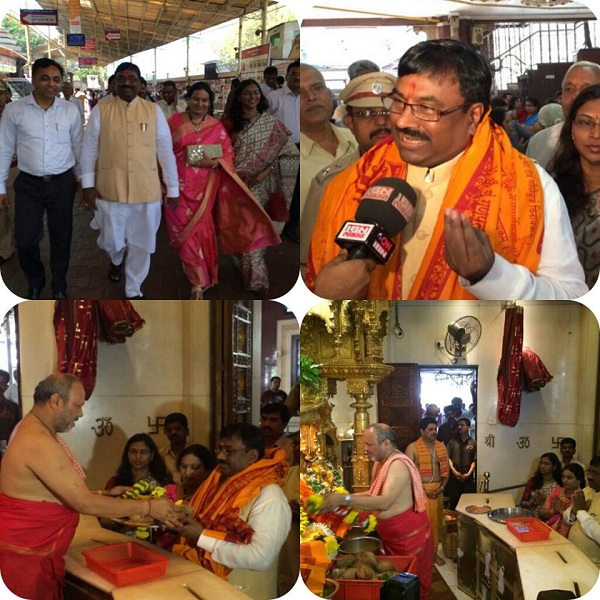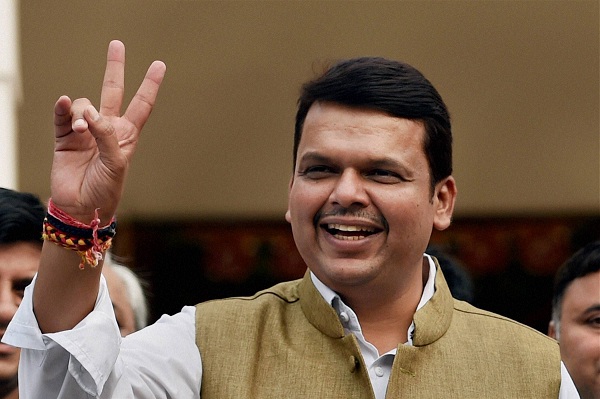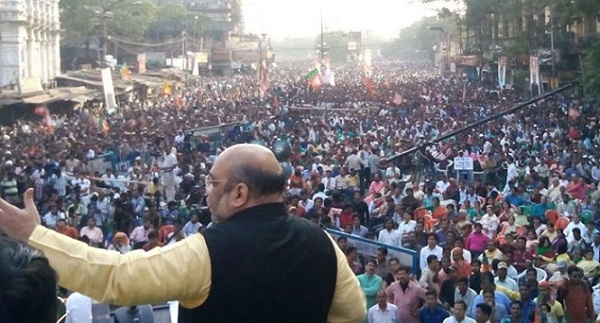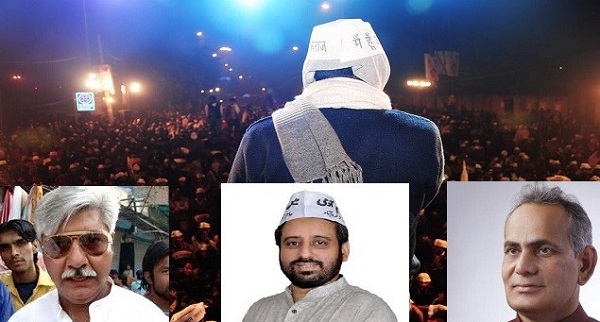
by admin | May 25, 2021 | Corporate, Corporate finance, Finance, News

State Finance Minister Sudhir Mungantiwar visited Siddhivinayak Temple before presenting the first budget of a BJP-led Maharashtra. Photo Courtesy Facebook
Mumbai: Maharashtra on Wednesday announced Local Body Tax (LBT) would be abolished from August 1 and extended tax exemption on essential commodities like rice and wheat in Budget 2015-16.
As regards LBT, a compensation of Rs. 6,875 crore will be given to the municipal corporations, excluding Mumbai. This was one of the main electoral promises of the BJP.
The loss of revenue would be compensated by enhancing the rate of tax under VAT which will be applicable to the whole state, Maharashtra Finance Minister Sudhir Mungantiwar told the Assembly while presenting his maiden budget in the state Legislature in Mumbai.
A revenue neutral rate has been recommended considering the share of increased tax collection to be given to the areas where LBT is not levied, he said adding that extensive deliberations are required on enhancement of tax rates under VAT.
The Mumbai municipal corporation gets substantial revenue by levying octroi on crude oil. The octroi amount is collected by oil companies as part of the state specific duty from all consumes in the state. This aspect is also required to be taken into account, the minister said.
The total plan size of the state is Rs. 54,999 crore and the budget estimates for 2015-16 are Rs. 1,98,230.50 crore.
As per the estimates, the revenue deficit would be Rs. 3,757.40 crore.
Mr. Mungantiwar, who presented a surplus budget of Rs. 107.10 crore, also announced tax proposals which are estimated to result in net revenue gain of Rs. 643 crore, which has been incorporated in the budget estimates of 2015-16.
He proposed a levy of 5 per cent entry tax on long steel, 12.5 per cent tax on all types of wood-free plain and pre-laminated particle boards.
He also announced extension of tax exemption on essential commodities like rice, wheat, pulses and their flour, turmeric, chillies, tamarind, jaggery, coconut, dates, Solapuri chadars and towels upto March 31, 2016.
The tax exemption on currants and raisins as well as 5 per cent tax on tea will also continue till March 31, 2016.
The Minister said that women drawing salary up to Rs. 10,000 per month will not have to pay professional tax. This will benefit nearly 1.5 lakh women in the state.
He also proposed to reduce sales tax on ladies’ purse and handbags from 12.5 per cent to 5 per cent.
Besides, work books, graph books, drawing books and laboratory books for students have been made tax-free.
The rate of excise duty on country liquor would now be 200 per cent of the manufacturing cost or Rs 120 per proof litre, whichever is higher.
Certain medicines required for treatment of cancer will also be exempted from tax and a list of such drugs would be notified separately.
Mr. Mungantiwar also proposed to reduce tax on guide wire required for medical treatment and LED bulbs from 12.5 per cent to 5 per cent.
Mr. Mungantiwar said new automation project for sales tax has been started which will help business and the sales tax department in further simplification of procedures.
All the processes envisaged under the GST are being incorporated in the new software system under development, so it will make hassle-free migration of data of existing tax payer to the new GST system.
He also announced enhancing premium on additional FSI which will result in substantial revenue gains.
The minister said the government has promised to enhance the FSI limit from 0.33 to 0.60 and increase the rate of premium in Brihanmumbai Municipal Corporation limit. It is also under consideration of the government to enhance the rate of premium on grant on all kinds of FSI.
These gains in FSI will benefit individuals, but the government does not get benefit of revenue increase in the same proportion.
These amendments are proposed to ensure legitimate share of revenue for the government from overall benefits accruing to the beneficiaries of the FSI without burdening the common man, he said.
The government intends to grant timely permissions, simplify procedures and charge legitimate premium on additional benefits.
As part of the amendments in the Maharashtra Value Added Tax Act, there will be no VAT on service tax and late fee for VAT return will be reduced from Rs. 2,000 to Rs. 1,000.
Similarly, multiple revised returns in case of audit findings or investigation proceedings by sales tax authorities would be allowed. Assessment can be initiated if there is reason to believe that the tax payer is not correctly discharging tax liability or is attempting to evade tax on any transaction.
The Finance Minister also proposed to introduce time limit for completion of transaction-wise assessment and also provide for cancellation of order, if it is done ex-parte.
Computation of interest in case of a revised return filed for a period less than a year is also proposed.
After the High Court approves merger or demerger of companies, a period of 30 days will be specified for making an application for registration from the date of notification by the registrar of companies, he added.

by admin | May 25, 2021 | Halal Food, Halal Industries, News, Opinions

Meat traders stage a protest against the ban on the slaughter of bulls and bullocks, at Azad Maidan (Courtesy: Express photo by Pradeep Kochrekar)
By Ram Puniyani
Can the dietary practices, the animal which is worshipped as a mother by section of population, be brought in on the political arena? While all this sounds surreal, its true as far as the role of cow is there in Indian political firmament. Recently Maharashtra Government got the Presidents assent to the bill “Maharashtra Animal Preservation (Amendment) Bill 1995 which will now ban the slaughter of bulls and bullocks as well. The defaulters will face a prison term of five years and a fine of Rs. 10000. When I first read ‘Animal Preservation’ part of the title of the bill, I thought this is some bill related to all the animals which are used for human consumption or deals with the use of animals for different purposes by the society. Contrary to that it turned out that this applies only to Cow and its progeny. A decade ago I was shocked to read that one of the outstanding scholars of ancient Indian History Professor Dwijendra Nath Jha received regular threats on phone telling him not to publish his book, ‘Holy Cow Beef in Indian Dietary tradition’. This scholarly work traces the place of beef in Indian diet from centuries.
The idea is to target the minorities for beef eating, and cow slaughter. One recalls that one of the slogans which rent the air in the run up the 2014 General elections was “Modi ko matdan, gai ko jeevadan [Vote for Modi, give life to the cow], BJP ka sandesh, bachegi gai, bachega desh [BJP’s message, the cow will be saved, the country will be saved]”. This slogan was propped up ‘Cow Development Cell’ of BJP.
As such emotive-identity issues are the hall mark of the politics in the name of religion. BJP built itself up on another identity issue, that of Ram Temple. The cow has always been accompanying and a parallel issue for political mobilization by RSS-BJP. It has also been the point of triggering violence in many cases all through. With the formation of VHP by RSS in 1964, cow issue has been systematically propped up time and over again. Many a misconceptions about cow, beef eating have been constructed. Building of misconceptions has also been extended to the dietary habits of the ‘Muslim’ community in particular. The profession of section of Muslims, Kasai (butcher), those in the trade of beef selling has been brought in to the ‘Hate other’, ‘social common sense’ in particular. The result being that it is perceived at broad layers of society as if beef eating is compulsory for Muslims. The notion which has been popularized is that Cow is Holy for Hindus: Muslims kill her! The perception is that the Muslim invaders brought beef eating into India. These misconceptions are by now the part of ‘social common sense’ of the large number of people in the society.
All the components of this are myths and stereotypes have been constructed over a period of time. Time and over again one hears about some small communal violence, killing of dalits and traders of cows leading to communal polarization. Many a dalits dealing with cow hide have been killed in places like Gohana in Hariyana and the VHP leaders had justified such acts.
Contrary to this the beef eating and sacrifice of cows was prevalent here from Vedic period. The sacrifice of cows in the Yagnas (ritual around fire) is extensively mentioned in the scriptures. There is mention about beef eating in various books. There is a phrase in Taitreya Brahmin which states ‘Atho Annam Via Gau’ (Cow is in veritably food) Different gods are mentioned to be having their choices for particular type of cow flesh. Prof D. N. Jha quotes innumerable examples of this in his masterpiece.
The preaching of non violence in India came with the rise of agricultural society. Jainism called for total non violence, while Buddhism talked non-violence; preventing of wasteful animal sacrifice in particular. It was much later that Brahmanism picked up cow as a symbol for Brahmanism in response and as a reaction to non-violence of these religions. Since Brahmanism has asserted itself to be the Hinduism it projects as if Cow is holy for Hindus overall. The matter of fact is that many sections of society, more particularly Dalits and Tribal have been eating beef all through. It is another matter that lately with the rising assertion of Hindutva, many a communities which are dependent on beef as a rich and cheap source of protein are gradually being forced to either give it up or do a rethink on that.
In contrast to what is being asserted by BJP and company, Swami Vivekanand had a different take on the issue. He points out speaking to a large gathering in USA said: “You will be astonished if I tell you that, according to old ceremonials, he is not a good Hindu who does not eat beef. On certain occasions he must sacrifice a bull and eat it.”
[Vivekananda speaking at the Shakespeare Club, Pasadena, California, USA (2 February 1900) on the theme of ‘Buddhistic India’, cited in Swami Vivekananda, The Complete Works of Swami Vivekananda, Vol 3 (Calcutta: Advaita Ashram, 1997), p. 536.]
This is corroborated by other research works sponsored by the Ramakrishna Mission established by Swami Vivekananda himself. One of these reads: “The Vedic Aryans, including the Brahmanas, ate fish, meat and even beef. A distinguished guest was honoured with beef served at a meal. Although the Vedic Aryans ate beef, milch cows were not killed. One of the words that designated cow was aghnya (what shall not be killed). But a guest was a goghna (one for whom a cow is killed). It is only bulls, barren cows and calves that were killed.”[C. Kunhan Raja, ‘Vedic Culture’, cited in the series, Suniti Kumar Chatterji and others (eds.), The Cultural Heritage of India, Vol 1 (Calcutta: The Ramakrishna Mission, 1993), 217.]
In response to this bill thousands of workers of Devnar abattoir (Mumbai), who will be losing their jobs came on the streets to protest against this move of the government (March 11). Many traders, from different religion also came to Azad Maidan in Mumbai to protest this communal act of the Maharashtra Government. In a PIL filed in the Bombay High Court the petitioner argues that this ban on beef infringes on the fundamental right of citizens to choose meat of their choice is fundamental. The hope is that the society overcomes such abuse of ‘identity issues’ for political goals and lets the people have their own choices in matters of food habits, and let those who are making their living from this trade do so peacefully.
—

by admin | May 25, 2021 | Business, Economy, News

Devendra Fadnavis
Mumbai: Beef, the popular red meat, was on Tuesday banned in Maharashtra with presidential assent being accorded to the relevant legislation — two decades after the assembly had passed it during the former Shiv Sena-BJP government in the state.
Presidential assent was accorded to the Maharashtra Animal Prevention (Amendment Bill), 1995, which bans even the slaughter of bulls and bullocks, but will allow the slaughter of water buffaloes, considered to yield an inferior quality of beef.
The state had already banned cow slaughter under the Maharashtra Animal Prevention Act, 1976, barring bulls or bullocks, the culling of which was permitted with certain regulations.
“Thanks a lot Hon President Sir for the assent on Maharashtra Animal Preservation Bill. Our dream of ban on cow slaughter becomes a reality now,” a pleased Chief Minister Devendra Fadnavis said in a tweet.
BJP MP Kirit Somaiya, who had led a delegation to President Pranab Mukherjee on the issue recently, termed the assent as “a historic step with cultural as well as economic implications for the state”.
He said the bill passed by the Maharashtra legislature in 1995 was forwarded for the president’s assent in 1996.
“Subsequent governments in the state failed to do the needful and get the Bill implemented. We had committed to do this in our manifesto and have fulfilled it,” Somaiya said.
Mumbai alone consumes around 90,000 kg beef daily, with around 25 percent accounting for water buffalo meat, called carabeef, through 900 licensed and hundreds more illegal outlets.
However, all the culling and processing of around 450 large animals which are slaughtered daily is carried out only at the Deonar Abattoir, Asia’s largest in north-east Mumbai.
Since the past several weeks, beef traders in a majority of the state’s cities and towns have been on strike protesting against harassment by right-wing and Hindu groups, who are also demanding closure of Deonar Abattoir.
Beef traders apprehend that the new development will render several thousands unemployed and also hike the prices of mutton, chicken, fish and other meats, both in the retail markets and in restaurants and hotels.

by admin | May 25, 2021 | News

BJP president Amit Shah addressing a massive rally in Kolkata in Nov 2014 (Photo credit – PTI)
Kolkata: After drubbing in the Delhi Assembly elections last week, bad news has come for Bharatiya Janata Party of Prime Minister Narendra Modi today from West Bengal where the party’s hard efforts to hold toe on the ground has failed. BJP candidates in both Assembly and Lok Sabha by-polls were defeated by the ruling Trinamool Congress of chief minister Mamata Banerjee.
Trinamool Congress retained the Krishnaganj assembly seat and established a substantial lead in the Bongaon Lok Sabha constituency where bypolls were held on 13th Feb and votes were counted today (16th Feb).
In Krishnaganj in Nadia district, Trinamool candidate Satyajit Biswas won by a margin of over 37,000 votes against his closest rival Manabendra Roy of the BJP.
In Bongaon, Trinamool candidate Mamatabala Thakur was ahead of her nearest rival Subrata Thakur of the BJP by over 1 lakh votes after the tenth round of counting. Thakur was leading in all seven assembly segments of the primarily rural constituency comprising parts of North 24 Parganas and Nadia districts.
In the last couple of months, Prime Minister Narendra Modi and BJP president Amit Shah had addressed public rallies in West Bengal.
However, BJP can take solace in that it got the second position in both the constituencies, pushing the CPI-M headed Left Front to the third spot. Congress seemed to be running a poor fourth.
| By-election Results – 2015 |
|
| State |
Constituency |
Winner |
Runner-up |
Last winner party |
| Andhra Pradesh |
Tirupati (Assembly) |
- Suguna (TDP)
- Sreedevi (Congress)
|
|
TDP |
| Arunachal Pradesh |
Liromoba (Assembly) |
|
|
|
| Goa |
Panaji (Assembly) |
Sidharth Kunkolienkar (BJP) |
Surendra Furtado (Congress) |
BJP |
| Maharashtra |
Mukhed (Assembly) |
|
|
|
| Tamil Nadu |
Srirangam (Assembly) |
|
|
AIADMK |
| West Bengal |
Krishnaganj (Assembly) |
Satyajit Biswas (Trinamool) |
Manabendra Roy (BJP) |
Trinamool |
| West Bengal |
Bangaon (Lok Sabha) |
Mamatabala Thakur (Trinamool) |
Subrata Thakur (BJP) |
Trinamool |
Besides West Bengal, by-poll was held for five assembly seats in as many states – Andhra Pradesh, Arunachal Pradesh, Goa, Maharashtra and Tamil Nadu.
As per the latest report, BJP has retained Panaji assembly seat in Goa. The seat had got vacant after then chief minister Manohar Parrikar was inducted in the Union Cabinet led by PM Modi.
Meanwhile, Tirupati seat in Andhra Pradesh has been retained by the ruling Telugu Desam Party.
In the 7th Feb full assembly election in Delhi, BJP had got just three seats while the young Aam Aadmi Party bagged 67 seats in the 70-member Assembly. In the 2013 Assembly poll, BJP had won 32 seats. In this election, Congress got a zero, perhaps first time in the history of Delhi assembly.

by admin | May 25, 2021 | News, Opinions

Arvind Kejriwal addressing a rally in Jamia Nagar on 3 Feb 2015. (Inset – (L-R) Asif M Khan, Amanatullah Khan, Braham Singh
By Dr Abdul Ruff,
How come Muslims in Delhi state, who have all along been supporters of Congress party, ensuring it came to power for three consecutive terms, have suddenly switched sides towards the new Aam Aadmi Party?
Answer is very simple. Muslims, like other communities in Delhi, have come to appreciate the concern the AAP has for common people and the good work done by the AAP led by Arvind Kejriwal both as a new government and before and after that.
They knew the national parties Congress and BJP for years now but they see AAP as the only sincere party that would serve the common people of Delhi, including Muslims with concerns and commitments. BJP and Congress parties promoted VIP culture in Indian capital and AAP has already made the common people a special status by providing them with privileges they had never known hitherto.
Arvind Kejriwal has become the only hope left for the common people among Muslims as well and they trust him. The trust of people in a leader is very important.
During the poll campaign days, Muslims in fact, like others, waited for Kejriwal to arrive their localities to address them. At the Muslim dominated Saheen Bagh in Okhla, for instance, Arvind Kejriwal was expected to arrive at 3.30 pm. Local leaders keep busy engaging the audience as it swells in size gradually. The now famous Aam Aadmi caps clearly outnumber skull caps. At 6.30 pm, there’s still no news on the arrival of Kejriwal. The venue, a narrow, long stretch of road was getting filled up fast. The balconies and rooftops of houses on one side of the road are nearly full. It’s 8.30 pm. There’s still no sign of Kejriwal. But the venue was packed to the brim. The AAP convenor finally arrives at close to 9.30 pm and the waiting crowd bursts into lusty applause.
Something has changed here between December 2013 and February 2015. In 2013, they treated the AAP with some suspicion, though its candidate, Irfanullah Khan, stood second by securing 23, 459 votes. That is no more the case now. The community backs AAP whole-heartedly.
Kejriwal reminds one of former Tamil Nadu CM MGR, an actor turned politicians, for whose arrival people used to wait for up to 24 hours. The waiting crowd in Delhi and the air of expectancy reveal that the AAP has gained considerable ground. The ability of the AAP to hold its own against the Narendra Modi-led turbo-charged campaign of the BJP in the national capital has convinced the community that they have a strong alternative to the Congress now.
Holding Congress responsible for the social, economic and educational backwardness of the Muslim community, a food technology graduate from Aligarh Muslim University sarcastically says, “Sachar committee and Ranganath Mishra commission reports tell the community what it has got from Congress as reward of loyalty.” Dr Tanweer Fazal, who teaches who teaches at Centre for the Study of Social Systems, Jawaharlal Nehru University (JNU), predicted that in many of the constituencies, Muslims would vote for the AAP. “In the last election, the community did not know if the AAP could defeat the BJP, but this time it is slightly different. Certainly, they will get benefit in some of the constituencies,” he observed. Yes, something has changed in the last one year. The Muslim community has changed itself.
The Congress party, like other so-called secular parties, uses pathetic looking and really poor Muslims as their vote bank and wants to make political capital of the sense of insecurity among the members of the Muslim community all over India and it pretends to be the chief protector of the Muslims and other minorities. But all this is only fool Muslims and steal their valuable votes to form cabinets to serve the rich and corporates
How did Congress betray the Muslims on the Babri Mosque issue is known to the world as Hindus in the party have tacit communication on Muslim issues and act accordingly!
Congress and allies have exploited the weak disposition of Muslims thus far.
Muslims now look with high hopes look to AAP to help them overcome difficulties and lead them to join national mainstream to live with dignity.






